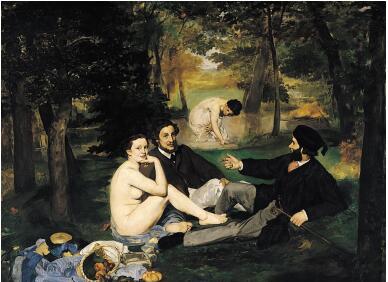Lunch on the Grass, originally titled The Bath girl, is a representative work of Eduard Manet, an oil on canvas painting, created between 1862 and 1863. It is now in the collection of the Musée d'Art
Manet was one of the founders of Impressionism, and although he never participated in an exhibition of Impressionism, he deeply influenced Impressionism and left an indelible mark.
The picture uses a triangular composition, the triangle formed between the characters adds a sense of stability and balance to the picture, coupled with the classical calm color, at first glance it looks like a decent work, but the flattening of the characters' clothing patterns in the picture, the outline of black, the use of local cold and warm colors, and the content expressed in the picture, the bold nude scenes, and the large brushstrokes, all make it jump out of the realism of the time and become a reformer of the painting art of the 19th century.

He was also a rebel, never stopping on the road of art. Manet sent the work to the French "Salon" in 1863 (an annual art exhibition organized by the French official government), which caused an uproar in France, bold brushstrokes, nude women, and straight-hook staring at the picture, this naked truth made people blush, caused public criticism, was considered to be unconventional, was an insult to art, and was rejected by the French salon exhibition.
The reform of art intensified, and the painters who were keen on innovation at that time all failed to participate in the exhibition. This included all the painters of the Impressionists, so the official temporary exhibition of the lost people's paintings was held, and then the blow to Manet was even greater, the official did not recognize, the public did not recognize, more people went to see Manet's paintings for ridicule, but there were also keen perceivers among them. Zola is one of them, a writer who later established himself in the French literary scene, who was deeply shocked when he saw Manet's work at the age of 26, and wrote "Monsieur Manet" to express his support and understanding for Manet. The Impressionists, on the other hand, rejoiced in the fact that they regarded him as the new leader. It is also this work that sets off the curtain of modern art and gradually develops and grows.
Manet was also expelled from the French art world for this work, which can be said to be "a failure", and Manet, who could not stand in Paris, ran to live in Spain, and finally died in a foreign country. It was not until after his death, the fame of Impressionism, this style of painting was gradually accepted by the world, Monedegar and others raised funds, purchased "Lunch on the Grass" and donated it to the Louvre, which was later collected by the Louvre, thus announcing that Manet's artistic style was officially accepted, and also laid the foundation for Manet's position in art history.
At Manet's funeral, the Impressionist master Degas said: "Manet's contribution is much greater than we think. Today, this phrase is still valid.